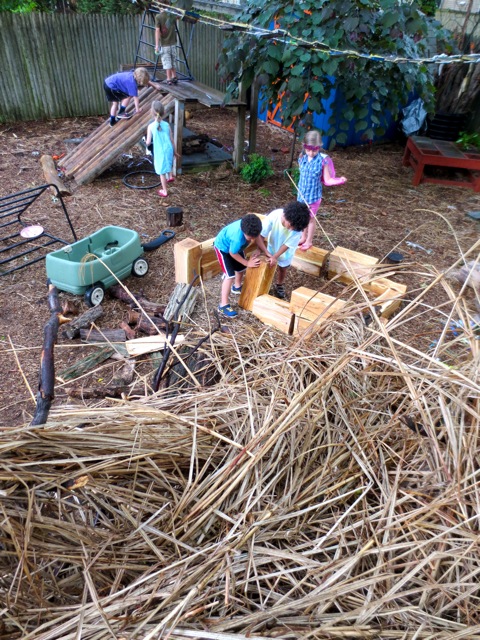Layers
Second to last day of school, last five minutes of school and . . . "She said she doesn't like me."
The first layer.
"I said that because she said she didn't like her first."
And there are layers two and three. One person sticking up for herself, one person sticking up for her friend, and one person holding her ground.
And so many layers to go with so little time. The layers of complex emotions held in tiny bodies and just like with adults, sometimes, maybe even a lot of times, the emotions get all tangled up and come out in words that don't really express the wholeness of the feelings or ideas.
We only had time to get to those first three layers, but the next day we sat as a group to problem solve this through during circle time.
We all know that endings are hard, whether they are the end of a really good book that we want to stay with, a vacation coming to a close, or leaving one home for another. The ending of a friendship has got to be the hardest. As grown-ups we know that when we change zip codes, the relationship does not necessarily cease to exist, but children don't have the perspective. Many of these children have gone to school together for 3 years. What happens when this school ends? Does that shared world also end? What does it mean for their friendships?
These are complex questions and really the children cannot even shape a question around what they are feeling, much less have the language to express the huge jumble of feelings they are having. They fall back on familiar feeling-feelings -- "I don't like you," may actually mean, "I need to know that I will continue to know you even when I am at another school and we no longer see each other regularly."
It may also mean, "If I like you and I am your friend, then it might mean that I am not friends with my favorite friend." It may also even mean, "I don't really know how to play with you even though we are together a lot." Maybe it means all of those things at the same time. How will we know unless we talk it through?
With young children, we cannot jump right to an assumption that there is something mean going on -- in fact, I would insist that we should assume that there is not. What we should go towards is working through what actually is trying to be said.
In this case, that is where we began our meeting, I tried to frame it in how we sometimes make "hard things harder." When it is time to say goodbye, it is hard, so sometimes we make things worse, possibly by saying, "I don't like you,"and then it feels easer to get through that rough patch. Adults have an expression for that, it is called "burning a bridge."
This made sense to the children gathered, there were nods as I reminded them that several of them don't like to talk about "hard things" like being redirected or having to talk about the very things we were talking about!
Then there is this -- we also must know and embrace that there is indeed a chance that these people do not like each other and isn't that a bendy branch to try to hang on to?
This scary perch of we-must-all-be-friends is so, so fragile. Isn't it is so much easier to insist, "Oh we all like each other!" when we would never presume or force that on a group of adults. We talked about this as a very real possibility and explored the ways we could express that feeling more acceptably, because of course, we may not like each other, but we do need to know how to express that in both a healthy and kind way.
To show you how capable these young humans are and how we must take time to talk/listen and learn from them, let me tell you what a 5-year old said, "Maybe they need to try to figure out what they have in common."
!!!!!!
And suddenly, the branch did not feel so bendy. It did not feel so fragile. These are hearty young souls going off to kindergarten. And in the meantime, just to note, it would have been so much easier to simply let the "I don't like you" layers slide away in the last moments of the school year. It would have been easier to parrot some phrase, "We are all friends here" or something similar, but then we would not have learned something so profound..."What do I have in common with you and once we know, we will find common ground."
Thank you Tracks 2014. You are ready to fly.
